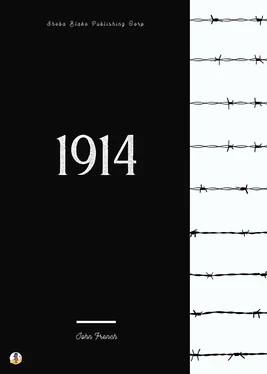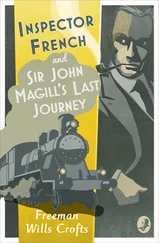John French - 1914
Здесь есть возможность читать онлайн «John French - 1914» — ознакомительный отрывок электронной книги совершенно бесплатно, а после прочтения отрывка купить полную версию. В некоторых случаях можно слушать аудио, скачать через торрент в формате fb2 и присутствует краткое содержание. Жанр: unrecognised, на английском языке. Описание произведения, (предисловие) а так же отзывы посетителей доступны на портале библиотеки ЛибКат.
- Название:1914
- Автор:
- Жанр:
- Год:неизвестен
- ISBN:нет данных
- Рейтинг книги:3 / 5. Голосов: 1
-
Избранное:Добавить в избранное
- Отзывы:
-
Ваша оценка:
- 60
- 1
- 2
- 3
- 4
- 5
1914: краткое содержание, описание и аннотация
Предлагаем к чтению аннотацию, описание, краткое содержание или предисловие (зависит от того, что написал сам автор книги «1914»). Если вы не нашли необходимую информацию о книге — напишите в комментариях, мы постараемся отыскать её.
1914 — читать онлайн ознакомительный отрывок
Ниже представлен текст книги, разбитый по страницам. Система сохранения места последней прочитанной страницы, позволяет с удобством читать онлайн бесплатно книгу «1914», без необходимости каждый раз заново искать на чём Вы остановились. Поставьте закладку, и сможете в любой момент перейти на страницу, на которой закончили чтение.
Интервал:
Закладка:
Lord Kitchener had asked me to send him a statement of the French dispositions west of the Meuse. I sent him this in the following letter:—
“Headquarters, “Le Cateau, “August 17th, 1914.
“My Dear Lord K.
“With reference to your wire asking for information as to the position of French troops west of the line Givet—Dinant—Namur—Brussels, I have already replied by wire in general terms. I now send full details.
“A Corps of Cavalry (three divisions less one brigade), supported by some Infantry, is north of the River Sambre between Charleroi and Namur. This is the nearest French force to the Belgian Army, and I do not know if and where they have established communication with them, nor do the French.
“One French Corps, with an added Infantry Brigade and a Cavalry Brigade, is guarding the River Meuse from Givet to Namur. The bridges are mined and ready to be blown up.
“In rear of this corps, two more corps are moving—one on Philippeville, the other on Beaumont. Each of these two corps is composed of three divisions. In rear of them a fourth corps assembles to-morrow west of Beaumont. Three Reserve divisions are already in waiting between Vervins and Hirson. Another Reserve division is guarding the almost impassable country between Givet and Mézières.
“Finally, other Reserve formations are guarding the frontier between Maubeuge and Lille.
“I left Paris on Sunday morning (16th) by motor, and reached the Headquarters of General Joffre (French Commander-in-Chief) at 12. They are at Vitry-le-François. He quite realises the importance and value of adopting a waiting attitude. In the event of a forward movement by the German Corps in the Ardennes and Luxemburg, he is anxious that I should act in echelon on the left of the 5th French Army, whose present disposition I have stated above. The French Cavalry Corps now north of the Sambre will operate on my left front and keep touch with the Belgians.
“I spent the night at Rheims and motored this morning to Rethel, the Headquarters of General Lanrezac, Commander 5th French Army. I had a long talk with him and arranged for co-operation in all alternative circumstances.
“I then came on to my Headquarters at this place where I found everything proceeding satisfactorily and up to time. I was much shocked to hear of Grierson’s sudden death near Amiens when I arrived here. I had already wired asking you to appoint Plumer in his place, when your wire reached me and also that of Ian Hamilton, forwarded—as I understand—by you. I very much hope you will send me Plumer; Hamilton is too senior to command an Army Corps and is already engaged in an important command at home.
“Please do as I ask you in this matter? I needn’t assure you there was no ‘promise’ of any kind.
“Yours sincerely, “(Signed) J. D. P. FRENCH.
“P.S.—I am much impressed by all I have seen of the French General Staff. They are very deliberate, calm, and confident. There was a total absence of fuss and confusion, and a determination to give only a just and proper value to any reported successes. So far there has been no conflict of first-rate importance, but there has been enough fighting to justify a hope that the French artillery is superior to the German.”
It was on Tuesday, August 18th, that I was first able to assemble the Corps Commanders and their Staffs. Their reports as to the transport of their troops from their mobilising stations to France were highly satisfactory.
The nation owes a deep debt of gratitude to the Naval Transport Service and to all concerned in the embarking and disembarking of the Expeditionary Force. Every move was carried out exactly to time, and the concentration of the British Army on the left of the French was effected in such a manner as to enable every unit to obtain the requisite time to familiarise troops with active service conditions, before it became necessary to make severe demands upon their strength and endurance.
My discussion with the Corps Commanders was based upon the following brief appreciation of the situation on that day. This was as follows:—
“Between Tirlemont (to the east of Louvain) and Metz, the enemy has some 13 to 15 Army Corps and seven Cavalry Divisions. A certain number of reserve troops are said to be engaged in the offensive of Liége, the forts of which place are believed to be still intact, although some of the enemy’s troops hold the town.
“These German Corps are in two main groups, seven to eight Corps and four Cavalry Divisions being between Tirlemont and Givet. Six to seven Corps and three Cavalry Divisions are in Belgian Luxemburg.
“Of the northern group, it is believed that the greater part—perhaps five Corps—are either north and west of the Meuse, or being pushed across by bridges at Huy and elsewhere.
“The general direction of the German advance is by Waremme on Tirlemont. Two German Cavalry Divisions which crossed the Meuse some days ago have reached Gembloux, but have been driven back to Mont Arden by French cavalry supported by a mixed Belgian brigade.
“The German plans are still rather uncertain, but it is confidently believed that at least five Army Corps and two or three Cavalry Divisions will move against the French frontiers south-west, on a great line between Brussels and Givet.
“The 1st French Corps is now at Dinant, one Infantry and one Cavalry Brigade opposing the group of German Corps south of the Meuse.
“The 10th and 3rd Corps are on the line Rethel—Thuin, south of the Sambre. The 18th Corps are moving up on the left of the 10th and 3rd.
“Six or seven Reserve French Divisions are entrenched on a line reaching from Dunkirk, on the coast, through Cambrai and La Capelle, to Hirson.
“The Belgian Army is entrenched on a line running north-east and south-west through Louvain.”
My general instructions were then communicated to Corps Commanders as follows:—
“When our concentration is complete, it is intended that we should operate on the left of the French 5th Army, the 18th Corps being on our right. The French Cavalry Corps of three divisions will be on our left and in touch with the Belgians.
“As a preliminary to this, we shall take up an area north of the Sambre, and on Monday the heads of the Allied columns should be on the line Mons—Givet, with the cavalry on the outer flank.
“Should the German attack develop in the manner expected, we shall advance on the general line Mons—Dinant to meet it.”
During these first days, whilst our concentration was in course of completion, I rode about a great deal amongst the troops, which were generally on the move to take up their billets or doing practice route marches. I had an excellent opportunity of observing the physique and general appearance of the men. Many of the reservists at first bore traces of the civilian life which they had just left, and presented an anxious, tired appearance; but it was wonderful to observe the almost hourly improvement which took place amongst them. I knew that, under the supervision and influence of the magnificent body of officers and non-commissioned officers which belonged to the 1st Expeditionary Force, all the reservists, even those who had been for years away from the colours, would, before going under fire, regain to the full the splendid military vigour, determination, and spirit which has at all times been so marked a characteristic of British soldiers in the field.
I received a pressing request from the King of the Belgians to visit His Majesty at his Headquarters at Louvain; but the immediate course of the operations prevented me from doing so.
The opening phases of the Battle of Mons did not commence until the morning of Saturday, August 22nd. Up to that time, so far as the British forces were concerned, the forwarding of offensive operations had complete possession of our minds. During the days which intervened, I had frequent meetings and discussions with the Corps and Cavalry Commanders. The Intelligence Reports which constantly arrived, and the results of cavalry and aircraft reconnaissances, only confirmed the previous appreciation of the situation, and left no doubt as to the direction of the German advance; but nothing came to hand which led us to foresee the crushing superiority of strength which actually confronted us on Sunday, August 23rd.
Читать дальшеИнтервал:
Закладка:
Похожие книги на «1914»
Представляем Вашему вниманию похожие книги на «1914» списком для выбора. Мы отобрали схожую по названию и смыслу литературу в надежде предоставить читателям больше вариантов отыскать новые, интересные, ещё непрочитанные произведения.
Обсуждение, отзывы о книге «1914» и просто собственные мнения читателей. Оставьте ваши комментарии, напишите, что Вы думаете о произведении, его смысле или главных героях. Укажите что конкретно понравилось, а что нет, и почему Вы так считаете.












